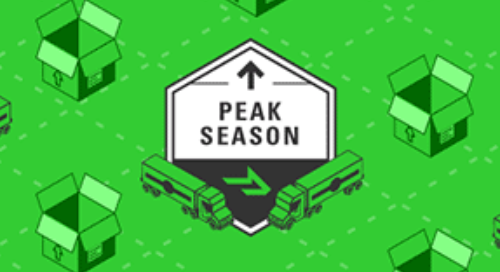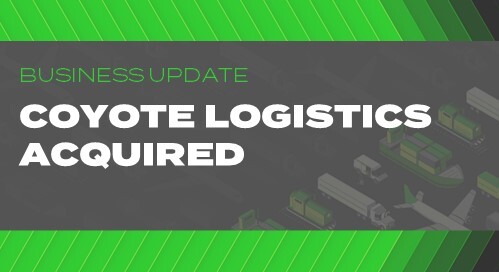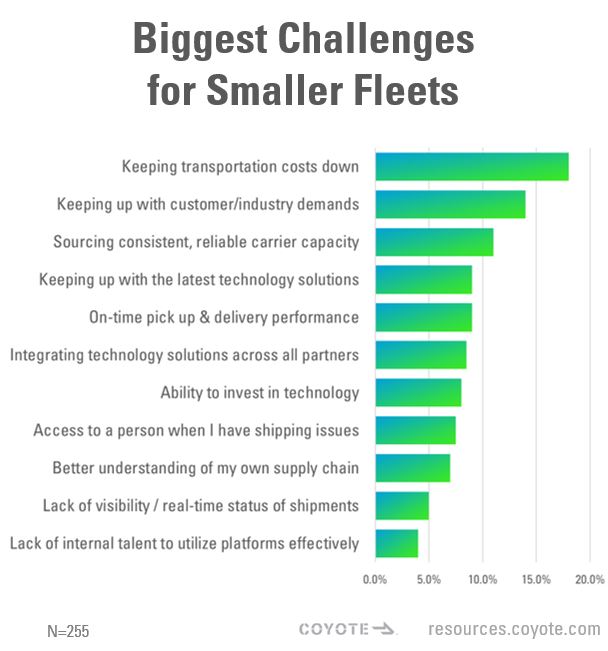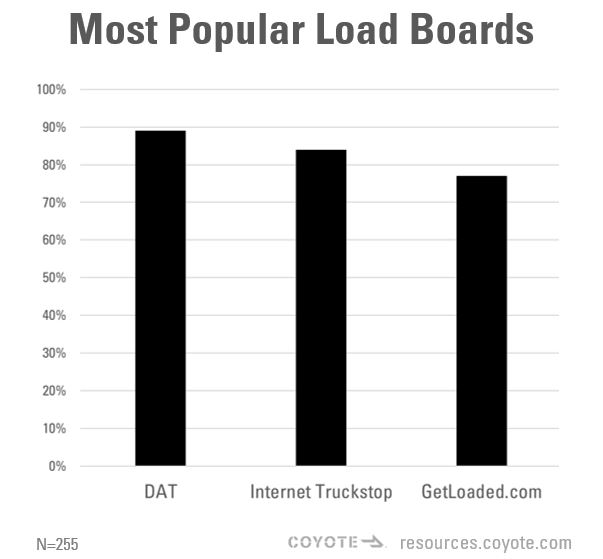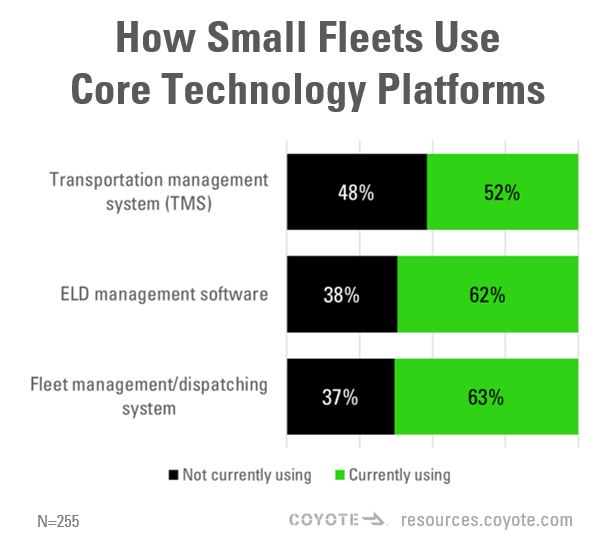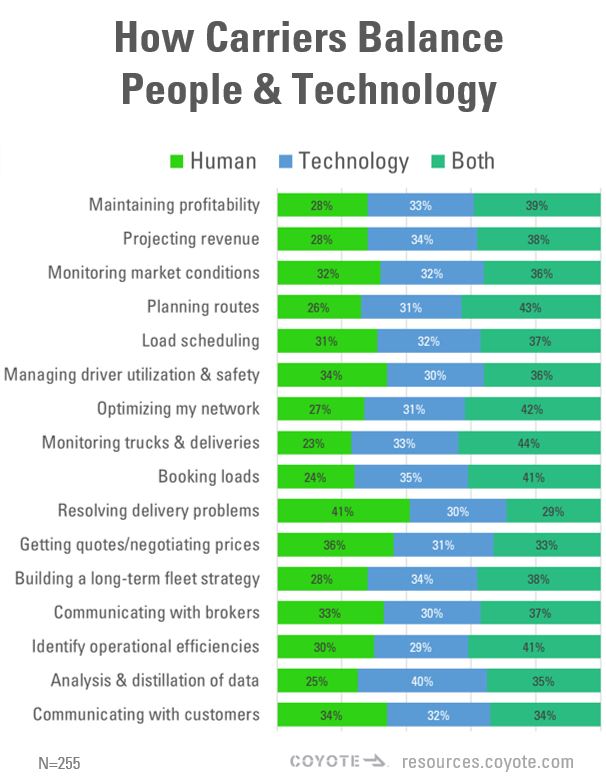Technology Guide for Truckers: How Small Fleets Are Using Digital Tools
Do you own or manage a fleet of 50 or fewer trucks?
Have you turned to technology to save money and improve efficiency, but you don’t know if you’ve made all the right choices?
Choosing the right trucking technology can be a real challenge for small fleets. You don’t have a limitless budget, so you need to make sure you are getting the most out of any tool or piece of software you purchase.
We Asked the Experts: Carriers Like You
We conducted an original research study on the balance between technology and human expertise in supply chains today.
We talked to over 850 supply chain and transportation decision makers from both shippers and carriers — you can download the full report to see what they all had to say.
As part of this study, we surveyed 255 trucking companies with fleets of 50 trucks or fewer — including 85 owner/operators — to find out how technology fits into their operations.
You can learn from their insights in this guide to technology for small, independent trucking companies like yours.
Find out what challenges your peers are solving with technology, what software they’re purchasing and how they’re using it, and when they’re choosing to outsource operations.
Technology Can Be a Problem, but It’s Also a Solution
When we asked small carriers to identify their biggest challenges with respect to transportation and logistics, the ability to invest in technology was just the 9th most popular answer out of 10 in our multiple-choice survey.
But even if carriers don’t think of technology itself as one of their chief concerns, it still influences the major issues they are facing today.
The top three responses to this question, accounting for nearly 40% of the vote, are all challenges that can be addressed at least in part with technological solutions, namely: keeping maintenance and operational costs down, unexpected time delays, and keeping up with customer/industry demands.
Technology can help carriers like you keep costs down, deal with delays and keep your customers satisfied through:
- Optimized route planning to keep fuel costs down, reduce dead miles and minimize wear and tear on your vehicles.
- Accurate tracking to improve visibility throughout your network and help avoid detention by enabling clear communication.
- Robust data reporting to keep shippers in the loop about their loads and your on-time pickup and delivery performance.
The Top Tech Challenges for Carriers Involve Cost and Implementation
So you know what technology can do for your fleet, but how do you acquire it? And how do you make sure it works?
Especially for smaller fleets, the cost of implementing a new software or platform can be daunting, and implementing it correctly can create its own anxieties.
Your peers agree.
Carriers top 3 challenges with the technology platforms:
- Lack of budget/funding to purchase
- Identifying a clear return on investment
- Integration with other systems and technical lift
A Trusted Partner Can Help
Especially if you’re an owner/operator, you’re probably very used to handling everything yourself. But if logistics tech challenges like these are slowing you down, you don’t need to go it alone.
Many carriers are turning to outsourced technology solutions to help them acquire data, analyze their own data, handle payments and improve their efficiency.
The most commonly cited types of outsourced data by the carriers we talked to were load board data and route optimization data.
A strong outsourcing partner can also help you handle some of your more data-intensive processes.
Smaller trucking companies often outsource:
- Insurance/claims
- Tracking
- Network optimization
Get a Load of These Load Boards
The DAT load board was the most popular among small fleet respondents. A whopping 89% of them indicated they use the DAT in some capacity.
Internet Truckstop and GetLoaded.com were also popular, used by 84% and 77% of small carriers respectively.
The general preference among carriers of this size is to book loads either digitally or with a digital tool used in tandem with human assistance.
76% of these carriers said they prefer either technology or both technology and human expertise together when it comes to booking loads.
Fleet Management Systems and ELD Are the Most Popular Trucking Company Technology
If you want to try to keep as many of your processes internal as you can, our study identified some great places to start.
In keeping with the general trends, the most popular trucking software platforms cited in our survey are the ones used for network optimization and tracking.
A majority of the small carriers we talked — 63% of them — said they’ve invested in fleet management or dispatching systems.
Trucking companies reliably turn to this software to help them keep track of where their drivers are and get them where they need to be most efficiently.
If you’re not currently using a fleet management system, our data says you’re probably considering it. An additional 23% of respondents told us they were exploring their options for this software, and only 14% had no current plans to use it at all.
Coming in just behind fleet management systems is electronic logging device (ELD) management software. 61% of smaller carriers have invested in this software, and another 24% are currently considering doing so.
People Still Have a Major Role to Play in Your Operations
The major insight of our research study was that all supply chains rely on a healthy mix of human expertise and technology.
Believe it or not, the percentage of technology preferred by carriers actually decreased in 2021 from our previous study in 2019.
What’s the ideal balance of human interaction and technology in your fleet?
2019: 41% human and 59% technology.
2021: 44% human and 56% technology.
This preference for people was even stronger among the smallest carriers.
U.S. trucking companies with fewer than three trucks were the only group in our study to actually favor a majority of human interaction over technology (58% people, 42% tech).
Carriers Prefer People for These Tasks
Trucking companies favored human interaction for these three tasks at the highest rate:
- Resolving delivery problems
- Obtaining quotes/negotiating rates
- Communicating with customers
Communication is at the heart of each of these. When things go wrong, when prices are in play or when customers have questions, carriers typically think the best solution is someone skilled to talk to.
Carriers Prefer Technology for These Tasks
On the other hand, the most frequently cited tasks that carriers want to turn over to technology are some of the most data-driven ones on the list:
- Analysis and distillation of data into actionable takeaways
- Projecting what my revenue should be
- Building a long-term fleet strategy
“Both” Is the Most Popular
Many carriers prefer to use a mix of people and tech for each individual task rather than picking one or the other.
Only one task — resolving delivery problems — received a “both” vote of lower than 30%.
Tops on the Tech Wish List: Forecasting and Route Optimization
We didn’t want the survey to just be about the “now,” we also wanted to prompt carriers to look toward the future.
We asked what technology solution they wished for that doesn’t readily exist today, and their answers lined up with the priorities they expressed through the rest of the survey.
What technology to carriers want that doesn’t exist today? Here are the top 2 answers:
- 32% want better freight market forecasting tools.
- 26% want advanced AI solutions.
How to Get the Best of Both Worlds: People & Technology
When we asked small fleet carriers how they prefer to:
- Monitor trucks and drivers
- Plan routes
- Book loads
- Optimize their networks
…more than 70% of them said they prefer either an all-digital or partially digital solution.
Our digital freight platform CoyoteGO® brings the tools your trucking company needs to do all of these and more together in one convenient platform.
You can search our database of 10,000 active loads per day, negotiate a rate in the platform, book instantly, report accessorials for reimbursement, submit invoices and optimize routes across your network either from your desktop or in our free mobile app.
And if you still prefer a human touch, our experienced support team is always here to talk whenever you need them.
Learn the top benefits CoyoteGO can give your trucking business.
Ready to sign up now? It’s fast, free and easy.



